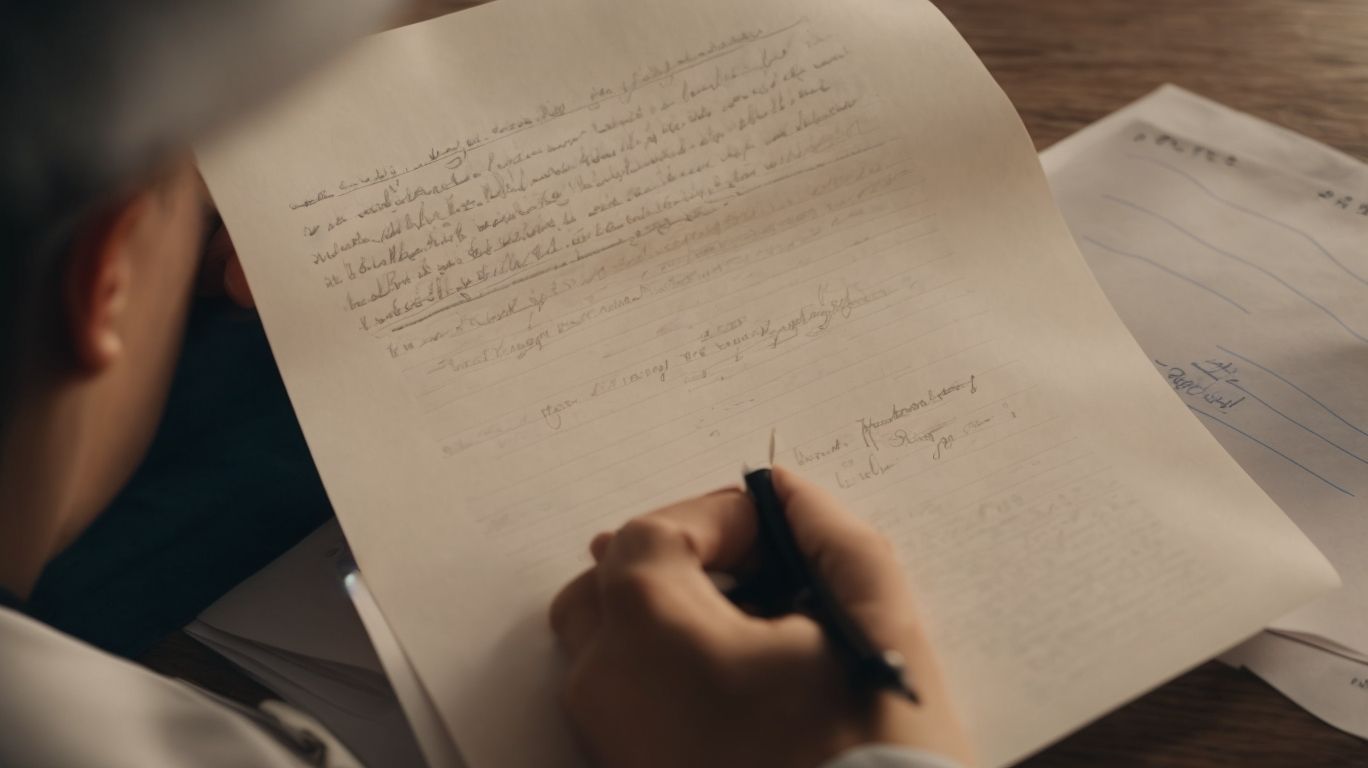Do you ever wonder what goes into a psychologist’s notes during a session? Look no further than SOAP notes. These organized and detailed records are essential in the field of psychology, providing a structured way to document the subjective, objective, assessment, and plan for each patient.
In this article, we will delve into the components of SOAP notes, how to write them effectively, and tips for psychologists to ensure thorough and standardized documentation. Let’s explore how these notes benefit both psychologists and their patients.
Contents
- 1 What Are SOAP Notes?
- 2 Why Are SOAP Notes Important in Psychology?
- 3 What Are the Components of a SOAP Note?
- 4 How to Write Effective SOAP Notes?
- 5 What Are Some Tips for Writing SOAP Notes in Psychology?
- 6 How Can SOAP Notes Benefit Psychologists and Patients?
- 7 Frequently Asked Questions
- 7.1 What are SOAP notes and why are they important in psychology?
- 7.2 How do I write effective SOAP notes in psychology?
- 7.3 What should be included in the subjective section of a SOAP note?
- 7.4 How do I write an effective objective section in a SOAP note?
- 7.5 Why is it important to include an assessment in a SOAP note?
- 7.6 Can SOAP notes be shared with other healthcare professionals?
What Are SOAP Notes?
SOAP notes are a structured method of documentation used by mental health professionals to track client treatment and assessment.
SOAP notes stand for Subjective, Objective, Assessment, and Plan – each section serving a specific purpose in the therapeutic process.
The Subjective part includes client-reported symptoms and feelings, providing insights into their emotional state.
The Objective section consists of observable and measurable data gathered during sessions.
Moving on to the Assessment, therapists analyze and interpret the information, formulating diagnoses and treatment goals.
In the final Plan section, they outline the interventions and strategies to be implemented. This structured format helps ensure clear communication among healthcare providers and supports holistic client care.
Why Are SOAP Notes Important in Psychology?
SOAP notes play a crucial role in psychology as they provide a structured format for mental health professionals to record client assessments, treatment plans, and progress, ensuring continuity of care and legal protection.
These notes not only serve as a roadmap for therapists but also act as a communication tool, enabling them to share vital information with colleagues and other healthcare providers efficiently. By structuring information into Subjective, Objective, Assessment, and Plan sections, SOAP notes help maintain a standardized approach to clinical documentation.
Privacy is paramount in handling sensitive client data, making the clear and concise language used in SOAP notes essential. This ensures that details are accurately captured while protecting the client’s confidentiality and the clinician’s credibility.
What Are the Components of a SOAP Note?
A SOAP note consists of four main components: Subjective, Objective, Assessment, and Plan, providing a comprehensive framework for mental health professionals to document client information and treatment strategies.
The Subjective section of a SOAP note focuses on the client’s self-reported symptoms, feelings, and experiences. It is crucial in understanding the client’s perspective and gaining insight into their mental state.
Moving on to the Objective part, this includes measurable data such as vital signs, observations made during the session, and any test results. It provides an objective view of the client’s current condition.
As for the Assessment component, it involves the therapist’s professional judgment and analysis of the client’s current status. This section typically includes diagnoses, progress evaluation, and potential areas of improvement.
The Plan section outlines the proposed treatment plan, interventions, goals, and follow-up actions to address the client’s needs.
Subjective
The Subjective section of a SOAP note captures the client’s self-reported experiences, feelings, and observations, providing valuable insights into their mental health status and treatment progress.
Ensuring privacy in collecting this information is crucial for establishing trust and maintaining confidentiality.
Conducting a thorough review of subjective data allows mental health professionals to understand the client’s unique perspective, preferences, and concerns, shaping personalized treatment plans.
Regularly revising the subjective section is essential to capture changes in symptoms, life events, or perceptions, ensuring that interventions are aligned with the most updated client information for effective care.
Objective
The Objective section of a SOAP note focuses on factual observations, test results, and diagnostic information gathered by mental health professionals during client assessments, forming the basis for treatment decisions and progress evaluation.
This component plays a crucial role in providing a detailed snapshot of the client’s current status. Through professional observations, clinicians can document behavioral patterns, physical symptoms, and emotional expressions, aiding in the accurate assessment of the client’s mental health condition. Test results from psychological assessments further contribute significantly to understanding cognitive functioning, emotional regulation, and overall well-being. Professionals rely on the rigor of testing procedures to gather precise data that informs the formulation of targeted interventions. Diagnostic insights derived from comprehensive evaluations enable practitioners to identify specific mental health disorders, establish differential diagnoses, and tailor treatment plans to address individual needs.
Assessment
The Assessment section of a SOAP note involves the clinical evaluation of a client’s mental health status, progress in therapy, effectiveness of treatments, and identification of strengths and challenges, guiding the formulation of tailored intervention strategies.
Within this component, mental health professionals delve into the intricate layers of a client’s cognitive processes, emotional responses, and behavioral patterns to gain a comprehensive understanding of their unique journey towards healing. By employing evidence-based tools such as standardized assessments, interviews, and observation techniques, therapists aim to track the evolution of symptoms, psychological well-being, and level of engagement in treatment over time.
Using a strength-based approach, emphasis is placed on identifying and nurturing the innate capabilities and resources within individuals to facilitate resilience and growth amid challenges. Client-centered assessments not only highlight areas for improvement but also acknowledge accomplishments, fostering a positive psychology perspective that promotes self-enablement and well-being.
Plan
The Plan section of a SOAP note outlines the proposed interventions, treatment strategies, goals, and session plans designed by mental health professionals to address client needs, promote quality care, and facilitate progress tracking.
Effective treatment implementation is vital in ensuring that clients receive the best possible care tailored to their specific requirements. Mental health professionals meticulously detail the interventions and strategies in the Plan section to create a roadmap for the client’s progress.
Session planning plays a crucial role in this process as it sets the stage for each interaction to be purposeful and aligned with the client’s treatment goals. Structured documentation of treatment plans aids in monitoring progress, adjusting strategies as needed, and evaluating the effectiveness of interventions.
Session notes are integral in enhancing patient care by providing a comprehensive record of each session’s outcomes, client responses, and any adjustments made to the treatment plan based on observed progress or challenges.
How to Write Effective SOAP Notes?
Crafting effective SOAP notes requires attention to detail, a structured writing style, and clear, concise language to ensure accurate communication, maintain client privacy, and support comprehensive documentation.
When structuring SOAP notes, it is crucial to separate subjective information from objective observations. Clear headings for each section – Subjective, Objective, Assessment, and Plan – help maintain a systematic approach and aid in quickly conveying information. Incorporating relevant keywords and entities enhances the note’s readability and searchability, ensuring vital details aren’t missed.
Always stay mindful of legal considerations surrounding client data. Use professional language, avoid jargon, and be cautious about the information shared to uphold confidentiality. By following these guidelines, your SOAP notes will effectively capture essential client interactions while safeguarding their privacy.
Use Clear and Concise Language
Utilizing clear and concise language in SOAP notes enhances communication effectiveness, ensuring that treatment details, client progress, and assessment findings are accurately conveyed and understood.
Clear and concise language in SOAP notes is crucial not only for effective communication but also for maintaining high-quality documentation. By using precise terminology and avoiding ambiguity, healthcare professionals can prevent misinterpretation of information and ensure seamless transitions in care. Concise language allows for quick comprehension, streamlining the information exchange process and saving time for both clinicians and staff members. Using clear language in SOAP notes offers legal protection by providing a detailed account of the client’s condition and treatment, which can be essential in case of disputes or legal inquiries.
Include Pertinent Information
Incorporating pertinent and relevant information in SOAP notes is essential to ensure the accuracy, efficacy, and quality of client documentation, enabling mental health professionals to make informed treatment decisions and track progress effectively.
By including thorough details such as the client’s demographic information, current symptoms, medical history, and response to previous interventions, mental health professionals can develop personalized treatment plans tailored to each individual’s needs.
Documenting any observed changes in behavior, emotional state, or cognitive functioning over time allows for a more comprehensive evaluation of the effectiveness of interventions and helps in identifying patterns or trends that may inform future therapeutic approaches.
Accurate and detailed documentation not only aids in ensuring the continuity of care but also facilitates collaboration among the treatment team by providing a clear overview of the client’s progress and any modifications made to the treatment plan.
Be Objective and Non-judgmental
Maintaining objectivity and a non-judgmental stance in SOAP notes is crucial to prevent misinterpretation, legal issues, or potential malpractice suits, ensuring that client assessments and treatment plans are based on factual data and professional observations.
By adhering to unbiased language, healthcare professionals establish a solid foundation for accurate documentation, which is essential for clinical decision-making and continuity of care. For instance, instead of writing ‘the patient seems lazy,’ an objective statement would be ‘the patient demonstrated decreased activity levels during the assessment period.’ This shift not only removes subjective judgment but also ensures that care is provided based on observable facts, guarding against allegations of negligence or inadequate treatment.
Use Proper Formatting and Organization
Adhering to proper formatting and organization standards in SOAP notes is essential for creating structured, professional documentation that enhances clarity, readability, and the systematic review of client information and treatment plans.
Structured and organized SOAP notes serve as a pivotal tool in the healthcare sector, aiding practitioners and clinicians in maintaining a coherent record of patient interactions and medical history.
By employing consistent formatting and logical organization, healthcare professionals ensure that vital details are not overlooked, leading to more effective communication among multidisciplinary teams and improved patient care outcomes.
Utilizing templates can streamline the documentation process, reducing errors and ensuring uniformity in reporting, which is vital for legal purposes and quality assurance in healthcare settings.
What Are Some Tips for Writing SOAP Notes in Psychology?
Writing effective SOAP notes in psychology requires attention to detail, adherence to professional writing standards, and a focus on clarity, concise language, and maintaining client privacy.
One practical tip for ensuring clear communication in SOAP notes is to use specific and objective language when describing client behaviors and responses. This not only helps other professionals understand the case but also enhances the overall quality of the documentation.
- Another strategy is to prioritize the confidentiality of client information by avoiding unnecessary details and only including essential data relevant to the treatment process.
- Integrating relevant keywords and entities related to the client’s mental health condition can also assist in providing a comprehensive overview of their progress and needs.
Be Thorough and Detailed
Being thorough and detailed in SOAP notes is essential to capture all relevant client information, treatment progress, and clinical observations, ensuring the comprehensive documentation required for effective therapy and progress tracking.
Thorough SOAP notes not only detail the client’s presenting issues and symptoms but also track treatment interventions, results of assessments, and the client’s response to therapy over time. Including quantitative data, such as specific dates, measurements, and test scores, adds a layer of objectivity to the notes and helps in monitoring progress objectively. For instance, noting down changes in the client’s mood from the initial assessment to each subsequent session provides valuable insights into the efficacy of the treatment plan.
Use Standardized Terminology
Employing standardized terminology in SOAP notes facilitates clear communication, accurate diagnosis, treatment planning, and progress tracking, ensuring consistency and precision in mental health documentation.
Standardized terminology in mental health SOAP notes sets a common language for healthcare professionals, aiding in seamless information exchange and reducing the chances of misinterpretation or errors. For instance, using ‘anxiety disorder’ instead of vague terms like ‘nervousness’ or ‘stress’ ensures specificity in recognizing and addressing the patient’s condition accurately. By consistently documenting symptoms, behaviors, and responses using agreed-upon terms like ‘suicidal ideation’ or ‘manic episode’, clinicians can swiftly assess progress and adjust interventions accordingly, thereby enhancing the quality of care and fostering better treatment outcomes.
Update Notes Regularly
Regularly updating SOAP notes is essential to reflect the most current client information, treatment plans, and progress indicators, ensuring the continuity of care, accuracy, and effectiveness in client management.
By revising these notes consistently, healthcare professionals can capture changes in a client’s condition, track improvements, or identify any setbacks promptly.
When revising SOAP notes, it’s crucial to include relevant keywords and entities that help paint a comprehensive picture of the client’s health journey.
Timely review of notes allows for adjustments in treatment plans, ensuring that interventions align with the most recent client data.
Integrating essential details in SOAP notes fosters a seamless flow of information, promoting better collaboration among healthcare providers and supporting the client’s overall well-being.
Keep Confidentiality in Mind
Maintaining strict confidentiality and privacy in SOAP notes is essential to uphold legal and ethical standards, protect client information, and safeguard professional integrity, ensuring secure documentation and respectful client interactions.
Confidentiality in SOAP notes serves as a fundamental aspect of healthcare practice, as it not only maintains the trust between providers and clients, but also ensures compliance with laws such as HIPAA. Handling sensitive information with care and respect is crucial; it involves proper storage of records, limiting access only to authorized personnel, and employing encryption methods for digital files.
Integrating privacy protection measures within the documentation process helps in mitigating risks of breaches or unauthorized disclosures. By including relevant keywords like ‘confidential’ or ‘privileged information’ in SOAP notes, practitioners can emphasize the sensitive nature of the content and remind themselves and others of the need for discretion.
How Can SOAP Notes Benefit Psychologists and Patients?
SOAP notes offer numerous benefits to psychologists and patients, enhancing communication, tracking progress, and ensuring continuity of care through structured documentation and professional clinical notes.
Improved communication is a key advantage as SOAP notes provide a standardized format for conveying vital information between practitioners and team members. This format facilitates clear and concise sharing of observations, diagnoses, and treatment plans, leading to more effective collaboration and streamlined care delivery.
The structured nature of SOAP notes aids in monitoring progress over time, allowing psychologists to assess the effectiveness of interventions and adjust treatment strategies accordingly. This systematic approach enables them to identify trends, evaluate outcomes, and make data-driven decisions that optimize patient care.
Facilitate Communication
SOAP notes facilitate effective communication among healthcare providers, ensuring connectivity, information accuracy, and collaboration in delivering quality care and optimizing patient outcomes.
Effective communication through SOAP notes allows healthcare providers to have a comprehensive view of the patient’s care history, treatment progress, and any concerns that need to be addressed. This comprehensive insight helps in making well-informed decisions and providing personalized care. Accurate documentation in SOAP notes is crucial for tracking patient progress, identifying trends, and implementing appropriate interventions promptly.
By incorporating precise details in SOAP notes, healthcare teams can improve care coordination, reduce medical errors, and enhance patient safety. Seamless communication facilitated by SOAP notes ensures that critical information is shared efficiently among providers, leading to timely and coordinated care delivery.
Track Progress and Treatment Plans
SOAP notes enable mental health professionals to track client progress, monitor treatment plans, and ensure effective implementation and management of therapeutic interventions, enhancing the quality of care and treatment outcomes.
Structured documentation provided by SOAP notes plays a crucial role in organizing vital information regarding a client’s history, current status, and treatment strategies. This structured format helps clinicians in comprehensively assessing the effectiveness of interventions and adjusting treatment plans accordingly. Through the consistent use of SOAP notes, mental health professionals can accurately document the client’s response to treatment, identify trends or patterns in symptoms, and collaborate with interdisciplinary teams to optimize care coordination. The systematic nature of SOAP notes facilitates the seamless integration of evidence-based practices and ensures the continuity of care across different healthcare settings.
Ensure Continuity of Care
SOAP notes contribute to the continuity of care by documenting client sessions, observations, diagnoses, and treatment plans consistently, ensuring seamless care transitions, accurate diagnosis, and effective treatment outcomes.
By maintaining comprehensive and structured notes, healthcare professionals can facilitate a smooth exchange of information between providers, ensuring that each stage of treatment aligns seamlessly. These notes serve as a valuable resource in accurately tracking progress, updating diagnoses, and refining treatment strategies over time.
The structured approach of SOAP notes aids in integrating essential keywords and entities related to the client’s health status, enabling a framework for collaborative decision-making and individualized care plans that are tailored to each specific case.
Frequently Asked Questions
What are SOAP notes and why are they important in psychology?
SOAP notes are a common method of documentation used in psychology to track a patient’s progress and treatment. The acronym SOAP stands for subjective, objective, assessment, and plan. These notes are important because they provide a structured format for recording important information about a patient’s mental health, treatment, and progress over time.
How do I write effective SOAP notes in psychology?
To write effective SOAP notes, start by gathering all relevant information about the patient’s current mental state, any changes since their last session, and any progress or challenges in their treatment. Use clear and concise language and avoid jargon. Remember to include both subjective (patient’s perspective) and objective (clinician’s observations) information. Lastly, make sure to include a clear assessment of the patient’s progress and a plan for their next session.
What should be included in the subjective section of a SOAP note?
The subjective section of a SOAP note should include information provided by the patient, such as their thoughts, feelings, and behaviors. This section should be written in the patient’s own words and should reflect their perspective on their mental health and treatment progress.
How do I write an effective objective section in a SOAP note?
The objective section of a SOAP note should include the clinician’s observations and measurements, such as vital signs, physical appearance, behavior, and mood. Use specific and measurable language to accurately capture the patient’s current state. Including relevant information from previous sessions can also help track the patient’s progress over time.
Why is it important to include an assessment in a SOAP note?
The assessment section of a SOAP note is crucial because it allows clinicians to evaluate the patient’s progress and determine if any changes need to be made to their treatment plan. It should include a summary of the patient’s current mental health state, any changes since their last session, and any potential diagnoses or concerns.
Yes, SOAP notes can be shared with other healthcare professionals involved in a patient’s treatment with the patient’s consent. They provide a comprehensive overview of the patient’s progress and can help ensure continuity of care. However, it is important to follow HIPAA guidelines and maintain patient confidentiality when sharing SOAP notes.




